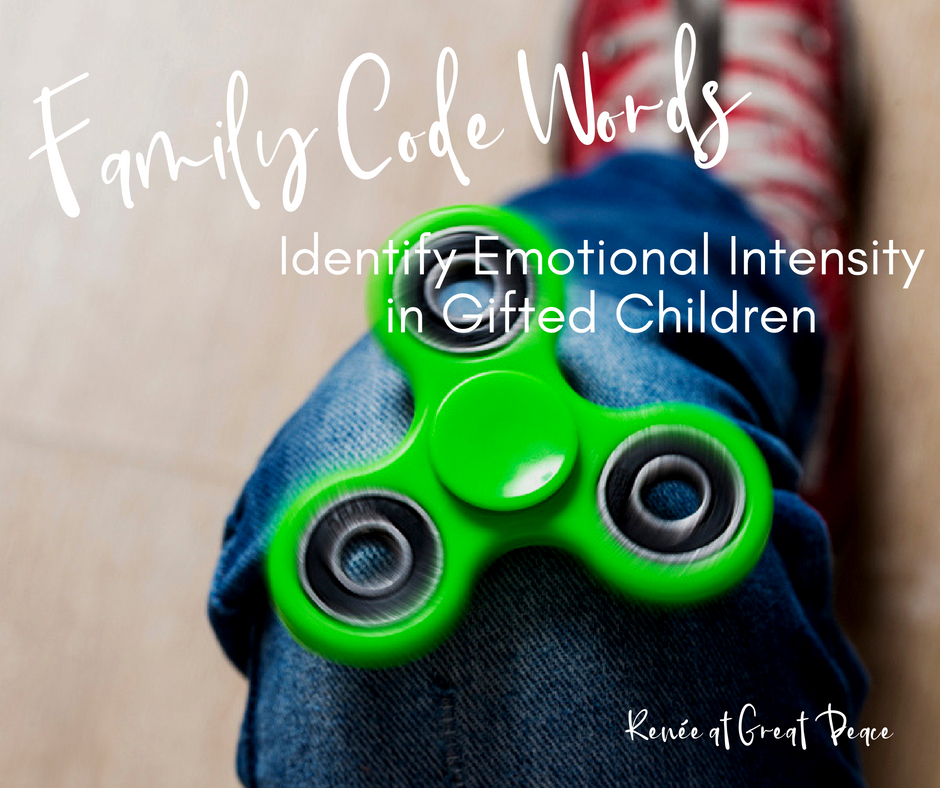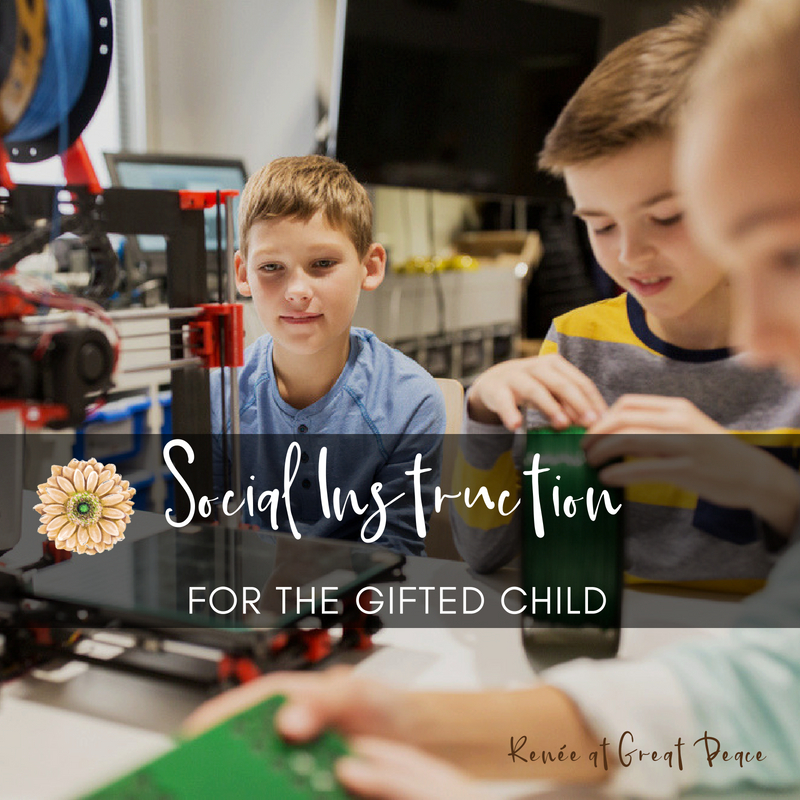
Embracing Gifted Intensity

Parenting Children with Gifted Intensity
How Gifted Intensity Presents in Children
“Explosions are not always aggressive outbursts of behavior. Sometimes they are more passive, subtle expressions of protest. They can even include anxious and sad behavior. Explosion, in this regard, refers to anything that disrupts the household and distorts the emotional functioning of the child.” Christine Fonseca, Emotional Intensity in Gifted Students, 2011, p. 185. (Note: the term explosion is a reference within the book regarding emotional intensity).
“Overexcitabilities are inborn intensities indicating a heightened ability to respond to stimuli. Found to a greater degree in creative and gifted individuals, overexcitabilities are expressed in increased sensitivity, awareness, and intensity, and represent a real difference in the fabric of life and quality of experience. Dabrowski identified five areas of intensity-Psychomotor, Sensual, Intellectual, Imaginational, and Emotional.” Overexcitabilities and the Gifted, Sharon Lind Citation From The SENG Newsletter. 2001, 1(1) 3-6.
“Because they can be so greatly stimulated, and because they perceive and process things differently, gifted children are often misunderstood. Their excitement is viewed as excessive, their high energy as hyperactivity, their persistence as nagging, their questioning as undermining authority, their imagination as not paying attention, their passion as being disruptive, their strong emotions and sensitivity as immaturity, their creativity and self0directedness as oppositional. They stand out from the norm, But then, what is normal?” Living with Intensity, edited by Susan Daniels, PhD. & Michael Piechowski, 2009, p. 4.
Parental Responsibility in Gifted Intensity
As is true of any parent, we are responsible for teaching our children how to have self-control, to grow in discipline, and in how to treat others. When an emotionally intense moment is occurring in the life of a gifted individual, they can become quite self-focused, self-involved and be lacking in consideration of others.
We need to teach our children that life is not all about them. We need to show them that their actions (behavior) regarding how they feel can have an impact on those around them.We need to teach our children the importance of kindness, gentleness, patience, and love.

11 Strategies for Embracing Gifted Intensity
▬ Learn what the emotional triggers are.
You may be able to narrow down key triggers and knowing them will help you to stay ahead and steer clear. This may not always work because gifted children are great at adapting. Therefore, the thing that is an emotional trigger today may not be an emotional trigger in a few weeks.
With gifted children, these triggers may constantly be changing. But, knowing the key ones can help to improve your reaction time and perhaps begin to redirect the child before the intensity goes too far.
▬ Redirection
This is actually a strategy I learned when my husband and I served as foster parents. Redirection is simply finding something that will take the child’s mind off of the source of their emotional frustration or excitement.
It could be that you offer another solution to the problem, such as “I realize that our plans for bowling fell through, but how about instead we go play mini-golf?” It doesn’t work for every child, but if it works for yours, then it’s a great parental tool.
Teaching your child to name their emotions can have lifelong benefits. Knowing how to identify what they are feeling can help them to understand why they are feeling the way they do, and it gives you an opportunity to pinpoint the source of the dilemma and offer suggestions for overcoming the intense feeling.
▬ Use Code Words
I’ll discuss this a bit more in a later paragraph, but basically having specific code words in the family can help you to identify intense times. Having a code word for when the child is experiencing excitability or overt anger can take the embarrassment away when dealing with the emotions in a public setting.
Letting them know with a code word that you see a specific behavior begin to take shape, can help stop it before it starts.
▬ Dialogue
Learn to have a dialogue with your child about their emotions. Ask leading questions like;
- What were you thinking about when you started to feel…?
- Why do you think that the ___ made you feel___?
- What do you think would be a good solution?
- Help your child to see that not every thought is a solution, and that sometimes, you just have to let go of hurtful things because they can’t be changed.
- While other times, finding a different solution might prove to be the better option anyway.
▬ Quiet time, alone.
Sometimes emotions can stem from over stimulation. That’s a good sign that your child might need some alone time. Whether it’s time to think, journaling (see below) or reading a book, some quiet time alone can help comfort your child. Note: This suggestion isn’t meant to be used as a punishment, but rather as a brief time to refocus the mind.
- Journaling
Whether it’s simply writing down their feelings on a piece of paper or writing out their thoughts in a journal, seeing emotions on paper can validate the feeling and offer a safe respectful method for emotional release. I remember one time suggesting to my son that he write down what he was feeling, he was about 5 at the time, and he wrote: “I’m angry because dad didn’t ___.” That was all he wrote, the feeling, and why he felt the feeling. It was all he needed to move on.
- Gentle Music
You know what they say about music soothing the savage… It can be true for the overly emotional intense child as well. Coupled with quiet time, and/or journaling this can give your child the perfect escape for a short time, to focus the mind, consider their emotions and then return and talk with you.As my child has gotten older and proficient playing the piano and keyboard, they are now one of his go-to solutions for self-calming.
- Teach your child to pray.
From very early in life, we taught our Young Man that he could pray to our Heavenly Father and share his emotions with him. We explained that God created his emotions and knows his heart. We taught him that when speaking his heart to the Father to do so with respect for God, but that he can always ask God to help him with whatever the problem is. I am truly amazed at some of the conversations I hear him having in prayer.Even if you aren’t a religious person, many people opt for some form of meditation. It can help to center the mind, and calm the heart.
- Set Clear, Unwavering Expectations
In our family respect is a requirement. If we don’t speak to each other with respect, then we do not get to speak. It’s a simple rule. That being said, as long as he is respectful toward others he can share how he is feeling and even offer suggestions.We don’t always follow the suggestions, but we do listen and consider them. However, if he speaks with disrespect, he can not participate in the conversation, in fact, he most likely will have to leave the room. This type of quiet time is a form of discipline.“When you can speak respectfully, then you can come back.”Your expectations may be different. That’s OK it’s whatever you need and will work with your family. Just always remain consistent with the expectation.
- Clearly define that there are consequences.Every choice in life has consequences. Emotional intensity while a natural part of the gifted child’s life is no less subject to consequences. Such emotions can be controlled if the child is willing to learn control.While the emotion is reactive, their behavior as a result of their emotions is a choice. They choose how they will react. The older they get the more this is so. We teach our young man that good choices lead to good consequences and bad choices lead to bad consequences.
Things YOu should avoid saying to your emotionally intense Gifted child
Parening Pet Peeve:
OK, I’m going to share a pet peeve with you. This one, honestly, has more to do with parenting any child than just gifted children, but it’s appropriate here. I never, and I mean never, tell my child that he is bad. I never tell him that he’s being bad. Because I never want to leave an impression in my child’s heart that he is not good. I only want to build him up, not tear him down.
Using words like; you’re bad, or you’re mean, or you’re rotten. They are not words that build up. They tear down. Instead, you can instruct your child by saying,
“You are not making good choices.”
“Your behavior is not appropriate.”
“You’re acting in a way that isn’t good.”
This takes the emphasis off of the “You” and puts in on the choice, the act.
That is all regarding my pet peeve. Back to emotional intensity in gifted children.

More on Code Words with Emotional Intensity
In our family, we call these times of OE’s, “spinning.” Because for us it seems as if Young Man is spinning in his mind and therefore the physical behavior reflects the thoughts.
Learning to have a code word in our family has been a tremendous help for both my husband and I as well as for our Young Man. My husband can say to me. “Did you notice that he seems to be spinning?” Then, we can talk to him to see what’s leading his mind to be over stimulated.
Often, I’ll come right out and ask him “Are you spinning?” He knows that I mean, in his thoughts and then we can dialogue about what he’s thinking about and offer coping skills to help him process in a positive way.
We have a few other code words in our family that helps us to identify specific emotions and behaviors. Having them, using them with each other in the safety of our family unit, has helped us to alleviate some emotionally intense times in public.
These words should be unique to your family. So that when you clue into a specific behavior, you can direct your child quietly. This becomes easier as the child gets older and can participate in using the code word(s).
Reminders about Parenting a Child with Gifted Intensity
You know that I am a believer and understand that children are created by the Lord, they are a blessing from Him and we should honor Him by using words of kindness and love while teaching our children to be self-controlled, and disciplined in their own spirits. If we truly take the time to embrace our children for the person they are we can see that their emotions are beautiful. Offering them strategies to help them to handle those emotions can be key to a joyful and happy home.
I’m not saying it’s always easy! Because it’s not. There will be times when you won’t be able to reason with your child. You might experience times when their behavior leaves you feeling, angry, embarrassed, and frustrated. There might be times when you will lose control of your own emotions, your own voice, and you will find yourself speaking in a manner that just precipitates their emotional response. You will see times when your child won’t reach calmness and you will wonder, How long will this last?
“Children are experts when it comes to understanding what makes us, the parent, lose control. This particularly is true with gifted children. They are able to assess our emotional state and determine the right time to pick and argument–the time when we are likely to respond poorly.” Christine Fonseca, Emotional Intensity in Gifted Students, 2011, p. 127.
You are the parent. You are the adult in the relationship. It’s important that you not only help your child learn self-control but that you train them by your own example of control.

Be sure to read my entire series on Homeschooling the Gifted Child.
It’s your turn, what do you feel are key strategies for embracing your child’s emotionally intense times?

Parenting Gifted Children Books to Read
- Parenting Gifted Kids, Dr. James Delisle
- Homeschooling Gifted and Advanced Learners by Cindy West
- Misdiagnosis and Dual Diagnosis of Gifted Children by Olenchak, Goerss, Beljan, Webb, Webb, & Amend
- How Am I Smart, A Parents Guide to Multiple Intelligences by Kathy Koch
- On the Social and Emotional Lives of Gifted Children by Tracy Cross
- Raising a Gifted Child by Carol Fertig
- Emotional Intensity in Gifted Students by Christine Fonseca
- Discover 100 Books for Gifted Learners
- 100 Games for Gifted Learners
- Outsource Homeschool Math with Online Learning Resources
10 Cool Ways to Study the Periodic Table
10 Cool Ways to Study the Periodic Table
This post is part of the iHomeschool Network Hopscotch.









7 Comments
Jamie
I absolutely NEVER leave comments on anything, but I just had to tell you what a blessing reading this was. My son has been struggling the last couple of weeks and I had no idea what it was but now I do! Reading this article, it felt like you were talking about my Connor. Thank you so much!
Renee Aleshire Brown
Oh I’m so glad that you found this helpful.
It’s funny this post is THE most pinned, and one of the most visited on my site. Thank you so much for commenting and letting me know that it is helpful to you! I recommend joining this FB group: https://www.facebook.com/groups/RaisingPoppies/ It’s a group for moms with gifted children, great place to get encouragement!
G W
Today was a tough day in our household, and this post popped up on my pinterest feed. It was much needed and well received, so thank you from the bottom of my heart for writing this post.
Renee Aleshire Brown
You are so very welcome! I hope that it helped to ease the tension in your household. If you need a bit more encouragement… You can join my Facebook Group for moms with special needs, gifted, and otherwise homeschooling kids. Hearts for Peace Homeschooling.
Sharon
Wow just wow! I have always known my daughter’s mind was something special, but in this past year since she started traditional school did I realize she was in the category of gifted children. I had no idea emotional intensity came with the package. Thank you for this! We need this knowledge in our family right now. Blessings!
Renee Aleshire Brown
You are so welcome! I know I was stunned as well, but it makes sense doesn’t it, when you really consider how the mind works. Glad you found this post, and hope it’s helpful to you.
Pingback: